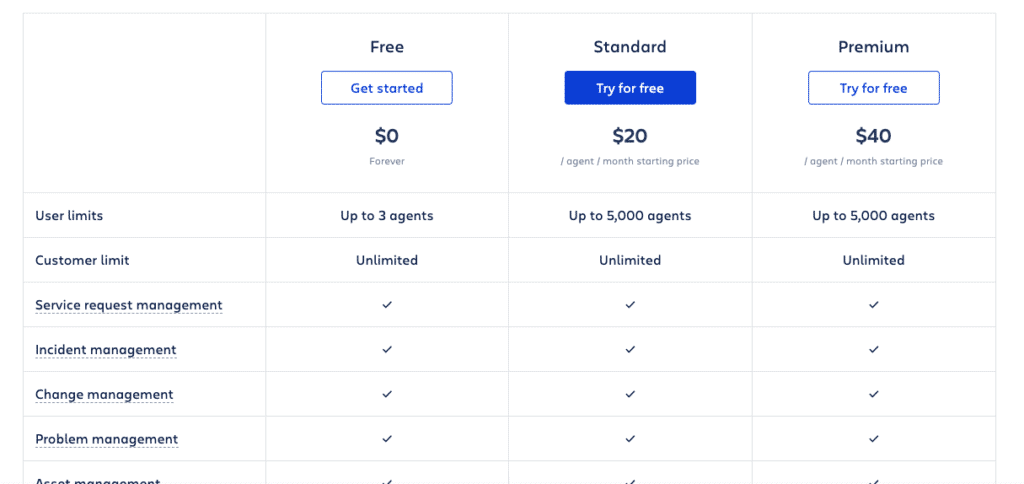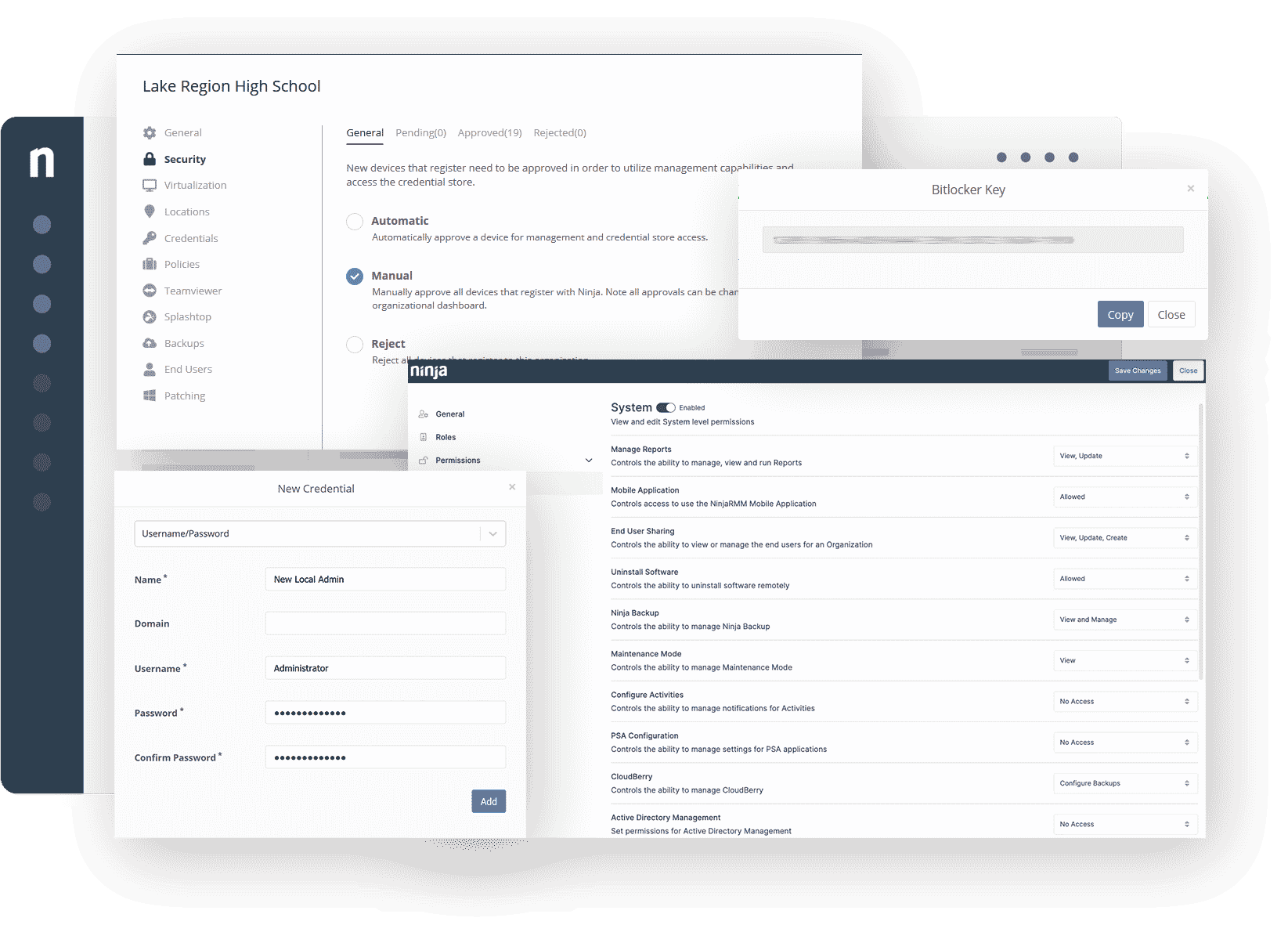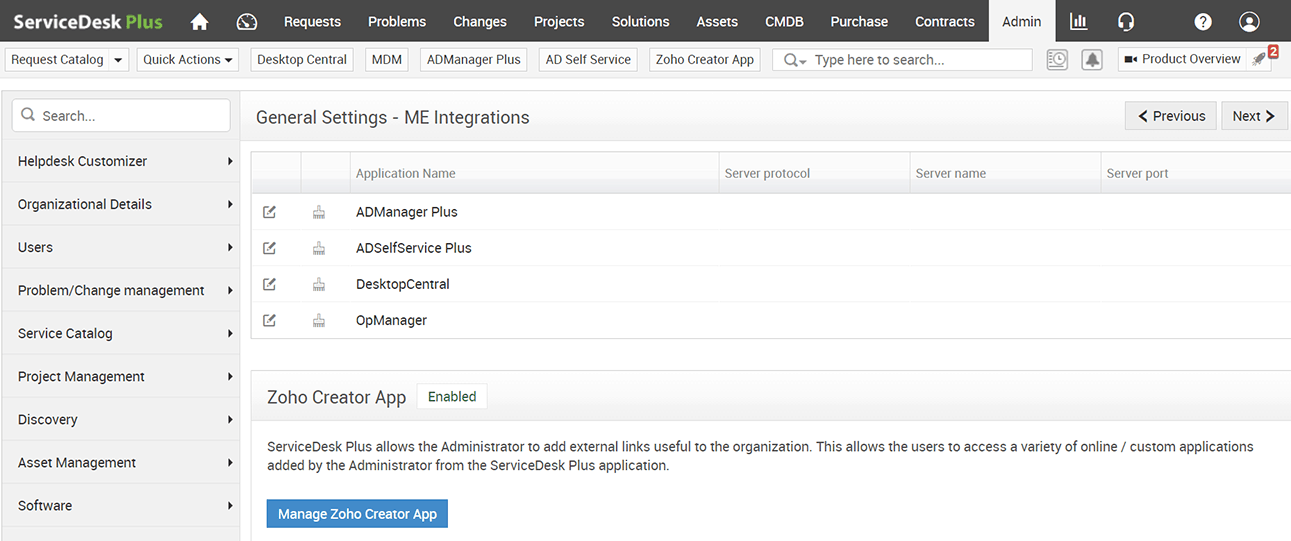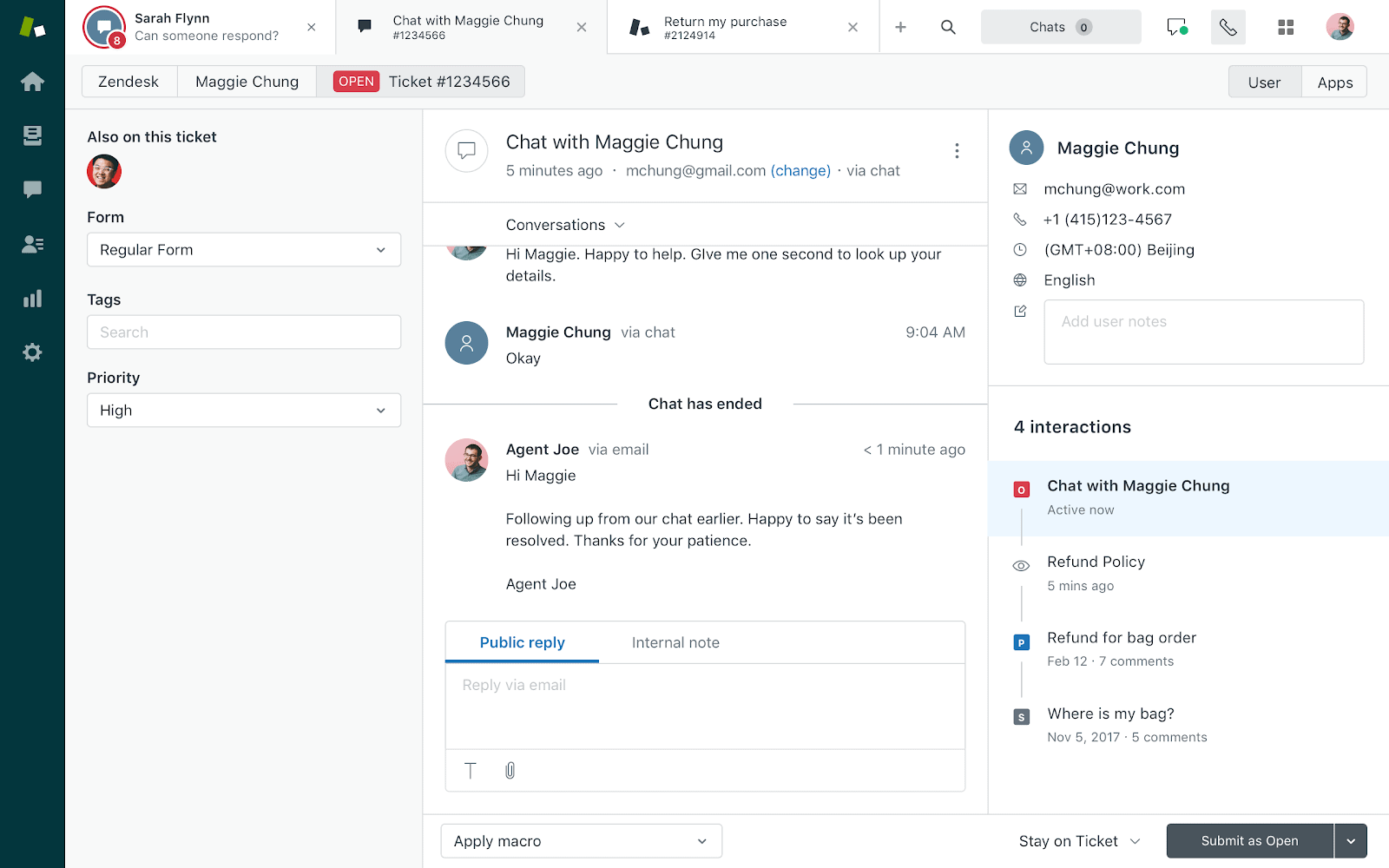We may earn a commission if you make a purchase through the links on our website.
JIRA Service Desk Review & Alternatives
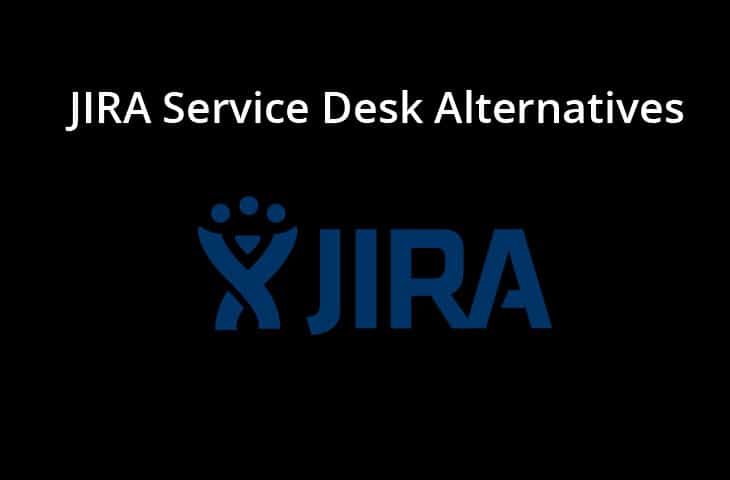
UPDATED: December 11, 2024
Jira Service Desk by Atlassian is a help desk request tracker and ticketing system. It is designed for teams that receive requests coming from other departments or customers. The service helps these teams receive, manage, track, and resolve requests easier, from a central desk. We will review JIRA Service Desk, as well as look at the best JIRA Service Desk alternatives for you to try.
Here is our list of the ten best JIRA Service Desk alternatives:
- NinjaOne – FREE TRIAL This remote monitoring and management system is built for use by managed service providers and it provides full IT asset management from a cloud platform. Access a 14-day free trial.
- ManageEngine ServiceDesk Plus – FREE TRIAL This IT asset management package provides a Help Desk function that provides ticketing and problem tracking. Access it as a Cloud service or install the software on Windows Server or Linux. Download a 30-day free trial.
- Zendesk – FREE TRIAL A suite of cloud-based services that centers on a customer support platform with extensions into CRM and other business process suites. Start a 14-day free trial.
- HaloITSM An ITIL-based Service Desk package that provides task tracking and team management functions for a range of DevOps functions including IT support. Access this service for installation on Windows Server or as a SaaS platform.
- FreshService An ITIL-based package that provides change management, problem management, and incident management with a ticketing system for task scheduling. This is a SaaS platform.
- SolarWinds Service Desk This on-premises package has a multi-tenanted option for MSPs and includes problem management through a Help Desk ticketing system and a self-service portal. Runs on Windows Server.
- SysAid An ITIL-based Service Desk package that includes a Help Desk ticketing system and a self-service portal. This is a SaaS package.
- Zoho Desk A SaaS package that offers a core Help Desk ticket management system for phone, email, and chat support with a range of extensions, such as a chatbot.
- Spiceworks Help Desk A free, ad-supported, cloud-based Help Desk system with a self-service portal for users that includes a knowledgebase template.
- BMC Helix ITSM (Remedy) Designed to ITIL4, this SaaS package offers a high degree of automation for Service Desk teams with a chatbot and ticket routing that also accounts for phone and email support.
Jira’s Pros & Cons
Jira is a good product, and probably one of the more well-known at what it does when it comes to tracking requests and tickets. The service request system is easy to use for those daily tasks, as users can submit tickets easily from many different channels. Their tickets can be linked to other tickets, and even associated with large projects.
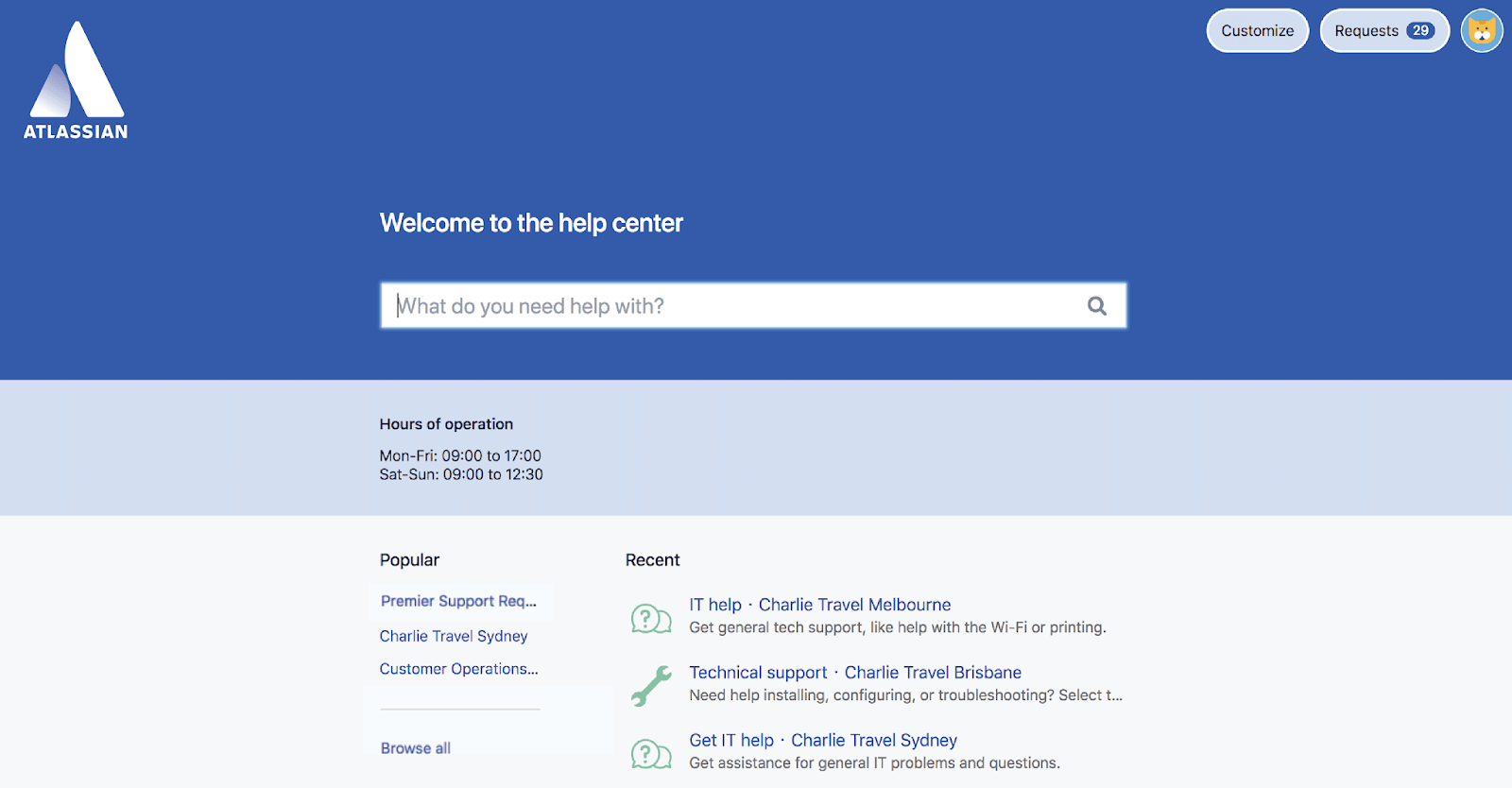
Pros:
- Easy Issue Tracking – Tracking problems easily and fast through tickets is probably the core of Jira.
- Great Collaboration – Allows multiple user collaboration on a single project. Jira also comes with extra communication tools, which allows users to forget about email.
- High Customization – You can change the feel and look of the help desk center and portal.
- Amazing Documentation and Knowledge Base – Provides comprehensive documentation that guides users on how to set up and use the product and knowledge base with common problems.
Cons:
- Rigid Email Notification System – According to many users, Jira’s email notification system cannot be fully customized. Their email notification system can get cluttered. The notifications cannot be modified per user or sent by batch.
- Complex Navigation and Too Many Features – Another pattern seen from many Jira Service Desk users is that the learning curve for the portal and navigation can be steep, and the portal could be too sophisticated. It also comes with many features, (some features are even useless), which can be overwhelming. There is a lack of an intuitive and easy to use dashboard.
- Difficult to Set Up – The administration and configuration of the entire solution can also get complex, especially for large environments. To configure and manage the platform requires some training. For example, the out-of-the-box fields and rules can be complicated to edit or remove.
- General Complexity – The administration and configuration of the entire solution can also get complex, especially for large environments. To configure and manage the platform requires some training. For example, the out-of-the-box fields and rules can be complicated to edit or remove.
Jira Price and System Requirements
Jira offers very flexible and simple pricing including free trials for their different plans:
- Standard – $20/agent/month for up to 5000 agents
- Premium – $40/agent/month for up to 5000 agents licenses
- Freemium Version – $0 forever for up to 3 agents
Jira also offers a premium consulting service integration to the Service Desk.
Jira can be downloaded and deployed on-premises or as a cloud-based SaaS. The software is supported by Windows, Linux, or macOS operating systems. There is also a mobile application for Apple iOS and Android.
The best JIRA Service Desk Alternatives:
Jira is a great help desk product, but if you are looking for something that provides similar capabilities at a lower price or something easier to implement, keep reading.
What should you look for in Service Desk software?
We reviewed the market for service desk systems that compete with Jira and analyzed the options based on the following criteria:
- A package that implements ITIL standards
- Incident management and problem management features
- Task management through a ticketing system
- SLA tracking and resolution deadlines
- Team management features
- A free trial or a demo that provides a cost-free opportunity to test the package
- Value for money from a JIRA ServiceDesk alternative that is offered at a better price
With these selection criteria in mind, we looked for service desk and help desk systems that fully compete with JIRA Service Desk.
1. NinjaOne – FREE TRIAL
NinjaOne is a cloud-based SaaS platform of remote monitoring and management tools that can be used by managed services to look after the systems of their clients. The system provides a subaccount structure so an MSP sets up a separate account for each client. This keeps all of the asset information and activity logs for each customer business completely separate and guarded by different access credentials. For each customer, the NinjaOne system scans the system, discovers all hardware, and draws up an inventory. The service then scans each endpoint and creates a software inventory. These information bases provide all of the material for Service Desk management.
Key Features:
- Automatic Asset Discovery: Automatically discovers IT assets across client systems, providing MSPs with comprehensive visibility.
- Hardware and Software Inventories: Generates detailed inventories of hardware and software assets, facilitating effective asset management.
- Ticketing System: Includes a ticketing system for user issues and service desk task management, ensuring timely resolution of IT issues.
- Patch Management: Offers patch management capabilities, allowing MSPs to deploy and manage software updates seamlessly.
- Remote Access Tools: Provides remote access tools, enabling technicians to troubleshoot and resolve issues efficiently.
Why do we recommend it?
NinjaOne comes highly recommended for Managed Service Providers (MSPs) seeking a comprehensive cloud-based solution for remote monitoring and management (RMM). With its robust suite of features, including automatic asset discovery, hardware and software inventories, patch management, and a ticketing system, NinjaOne streamlines IT operations for MSPs. The platform's subaccount structure ensures data segregation and security, allowing MSPs to manage each client's systems effectively. Additionally, NinjaOne's self-service portal and knowledge base empowers users with self-help options, reducing dependency on technician intervention.
The package includes a ticketing system that is fronted by a self-service portal for users. This portal can also host a knowledge base with advice for users. The knowledge base system can also be used to set up guides for technicians. The ticketing system can also receive automated system monitoring alerts, so it creates a full technician team management package.
Who is it recommended for?
NinjaOne is ideal for Managed Service Providers (MSPs) looking for a cloud-based RMM solution to manage their clients' systems efficiently. Designed with a multi-tenanted architecture, NinjaOne enables MSPs to set up separate accounts for each client, ensuring data isolation and security. The platform's comprehensive feature set, including automatic asset discovery, inventory management, and ticketing system, caters to the needs of MSPs servicing multiple clients. Whilst NinjaOne lacks an on-premises version, its cloud-based nature offers scalability and accessibility, making it suitable for MSPs of all sizes.
Pros:
- Multi-Tenanted Architecture: Enables MSPs to manage multiple clients' systems securely and efficiently.
- Automatic IT Asset Inventory Management: Automatically manages IT asset inventories, reducing manual effort and ensuring up-to-date asset information.
- Constant System Monitoring: Offers constant system monitoring with alerts for discovered problems, enabling proactive issue resolution.
- Self-Service Portal and Knowledge Base: Empowers users with self-help options and reducing dependency on technician intervention.
Cons:
- No On-Premises Version: Lacks an on-premises version, limiting deployment options for organizations with specific infrastructure requirements.
You can find out more about pricing by registering for a free trial, and receiving a custom quote. You can assess the NinjaOne system with a 14-day free trial.
EDITOR'S CHOICE
NinjaOne is our top pick for a Jira Service Desk alternative because it includes an integrated ticketing system into its remote monitoring and management package, making it a great deal and appealing for small to mid-sized organizations. Unlike Jira Service Desk, which often has a steeper learning curve and requires extensive configuration to optimize workflows, NinjaOne offers an intuitive design that simplifies setup and day-to-day use. This ease of use is highly valued by users who prefer quick deployment and minimal training requirements. One of NinjaOne's best services is its comprehensive automation capabilities, which allow IT teams to efficiently manage tasks like patching, monitoring, and remote access from a single platform. These capabilities are integrated seamlessly, enabling teams to address service tickets alongside routine IT operations without needing to switch between multiple tools. In contrast, Jira Service Desk often relies on additional Atlassian tools or third-party integrations to achieve similar functionality. Another important advantage is NinjaOne's superior customer support and user satisfaction ratings. Reviews frequently highlight the platform's responsive support and active community, which contribute to its reliability as a service desk solution. While Jira Service Desk also has strong community backing, its support model often varies depending on the chosen plan, which can be a limitation for some users.
Download: Get a 14-day FREE Trial
Official Site: https://www.ninjaone.com/freetrialform/
OS: Cloud based
2. ManageEngine ServiceDesk Plus – FREE TRIAL
ManageEngine ServiceDesk Plus is an IT help desk software that helps deliver excellent customer service. The software provides central control and visibility of all the IT issues and tickets. You can manage and track all the problems throughout the entire lifecycle. With ManageEngine ServiceDesk Plus, you can to categorize, analyze, and close problems. These actions allow you to record the root cause and improve response times for later incidents.
Key Features:
- Service Catalog: Provides a service catalog for organizing and categorizing IT services, facilitating easy access and request submission.
- CMDB (Change Management DB): Includes a comprehensive CMDB for managing changes and configurations, ensuring accurate documentation and tracking.
- IT Project Management: Offers IT project management capabilities, enabling organizations to plan, execute, and track IT projects effectively.
- Integrations with Third-Party Software: Integrates seamlessly with third-party software, enhancing functionality and interoperability.
- Comprehensive Reports: Generates comprehensive reports, providing insights into IT performance, ticket resolution, and service delivery.
Why do we recommend it?
ManageEngine ServiceDesk Plus is highly recommended for organizations seeking an all-in-one IT help desk solution to deliver exceptional customer service. With its comprehensive suite of features, including service catalog, CMDB, IT project management, and integrations with third-party software, ServiceDesk Plus centralizes control and visibility of IT issues and tickets. The platform facilitates efficient problem management, allowing users to categorize, analyze, and close problems while recording root causes for future incident prevention and improving response times.
End-users can submit tickets from multiple channels, like email, phone, self-serving portal. The tool automatically creates the tickets and assigns them to a technician (or group) based on expertise. The service does not only help you resolve tickets, but you can also manage IT projects, manage change and configuration, assets, and more. The tool can be deployed on-premises or in the cloud.
Who is it recommended for?
ManageEngine ServiceDesk Plus is ideal for organizations of all sizes looking for a robust IT help desk solution. Designed to streamline IT service management, ServiceDesk Plus caters to various industries and business needs. End-users can submit tickets through multiple channels, including email, phone, and self-serving portal, ensuring accessibility and convenience. Whether deployed on-premises or in the cloud, ServiceDesk Plus offers cross-platform support for Windows and Linux server distributions, making it suitable for diverse IT environments.
Pros:
- Robust All-in-One Tool: Serves as an all-in-one solution for managing client contracts, maintenance requests, and ancillary services offered by MSPs.
- Automatic Asset Discovery: Features automatic asset discovery, keeping NOC teams informed of scope and new devices added to the network.
- Cross-Platform Support: Offers cross-platform support, working with both Windows and Linux server distros, accommodating diverse IT environments.
- Deployment Options: Available for both on-premises deployment, and as a SaaS solution, providing flexibility and scalability.
Cons:
- Learning Curve: Offers a range of services and products, which may require time to fully explore and utilize, potentially posing a learning curve for users.
ManageEngine ServiceDesk Plus comes in three editions; Standard, Professional & Enterprise. Sign up to the 30-day free trial of ServiceDesk Plus in the cloud or on-premises.
3. Zendesk – FREE TRIAL
Zendesk is a customer support ticket system. The Zendesk Support and element of the Zendesk Suite is an easy-to-use system for tracking, prioritizing, and resolving support tickets. Zendesk is very flexible and great for any size of business. It comes as a suite of various customer service and engagement products.
Key Features:
- Flexible Ticketing System: Automated workflows which enable efficient tracking, prioritization, and resolution of support tickets.
- Mobile Support: Agents can access Zendesk via mobile apps for iPad, iPhone, and Android devices, ensuring responsiveness and productivity on the go.
- Out-of-the-Box Integrations: With over 100 integrations with third-party apps, Zendesk facilitates seamless workflow integration, enhancing productivity and collaboration.
- Advanced Reporting and Analytics: Provides robust reporting and analytics tools, offering valuable insights into customer support performance for continuous improvement.
Why do we recommend it?
Zendesk is highly recommended for its user-friendly customer support ticket system, offering easy tracking, prioritization, and resolution of support tickets. With its flexible ticketing system and automated workflow, Zendesk streamlines ticket management, enhancing operational efficiency. The platform's mobile support for various devices ensures accessibility and convenience for agents on the go, facilitating timely responses to customer queries. Additionally, Zendesk boasts over 100 out-of-the-box integrations with third-party apps, enabling seamless workflow integration and enhanced productivity. Its advanced reporting and analytics tools provide valuable insights into customer support performance, aiding in continuous improvement initiatives.
You can start with one agent and support, or get a bundle of tools with more agents, or even choose from single tools, such as Guide, Chat, Talk, Sell, Explore, Gather, and Connect. The software integrates all ticket source channels, like email, phone, messenger, chat, into a single omnichannel solution.
Who is it recommended for?
Zendesk is ideal for businesses of all sizes seeking a comprehensive customer support solution. Its intuitive interface and centralized ticketing management make it suitable for teams looking to consolidate their support tools for improved collaboration and efficiency. Whether starting with a single agent or opting for a bundle of tools, Zendesk offers scalability to meet the evolving needs of businesses. With omnichannel support, Zendesk caters to organizations looking to streamline customer interactions across various channels, enhancing customer satisfaction and loyalty. Overall, Zendesk is recommended for any business looking to elevate its customer support experience and drive long-term success.
Pros:
- Simple and Intuitive Interface: User-friendly interface makes it easy for agents to navigate and use the platform effectively, minimizing training time and maximizing productivity.
- Centralized Ticketing Management: Consolidates ticketing management and chat functionalities, streamlining team-based tools and enhancing collaboration.
- Knowledge Base: Easy to set up and helps reduce the volume of new tickets by providing self-service options for customers.
Cons:
- Interface Complexity: Some users may find Zendesk's interface slightly complex, requiring simplification for easier navigation and use.
Zendesk has a highly flexible pricing plan. There are various plans for Zendesk Support, starting from:
- Essential ($5 per agent/month)
- Support ($19 per agent/month)
- Professional ($49 per agent/month)
- Enterprise($99 per agent/month)
- Elite($199 per agent/month)
Start a Zendesk 14-day free trial for a limited time by registering to Zendesk official site.
4. HaloITSM
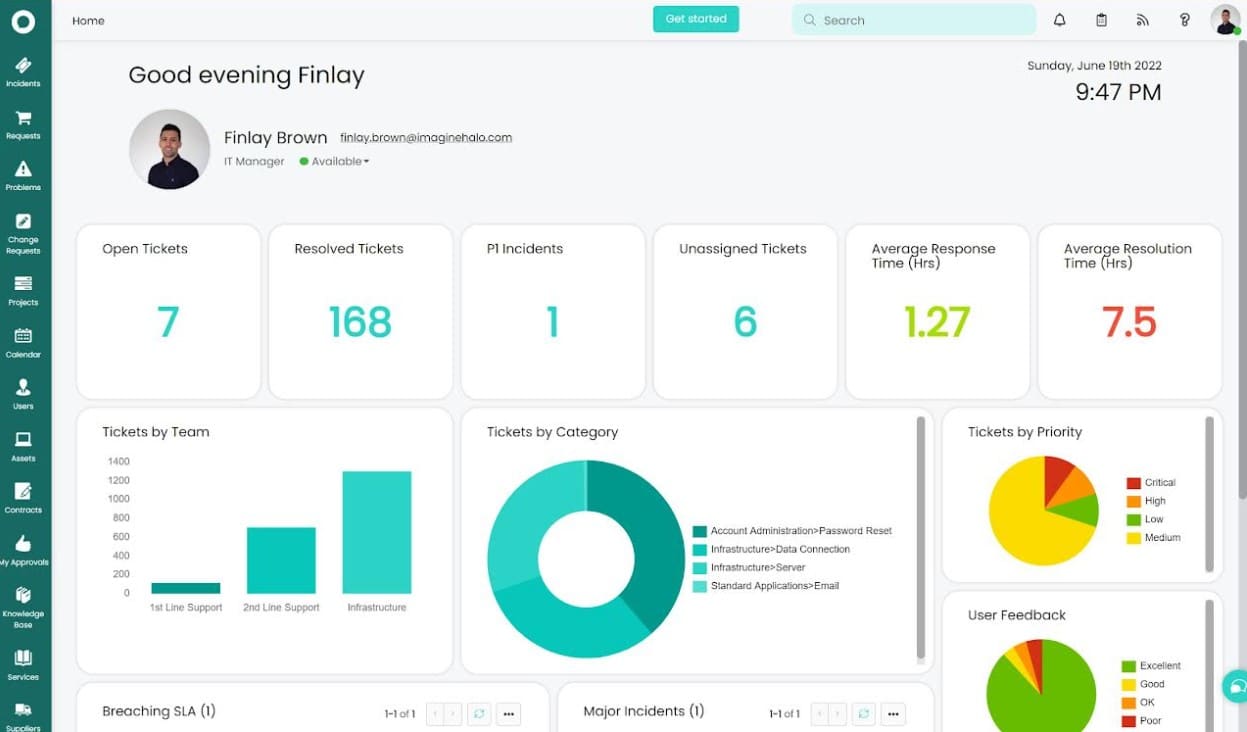
HaloITSM is a service desk platform that was designed following ITIL guidelines. The modules in the HaloITSM package include Incident Management, Change Management, Problem Management, Configuration Management, Knowledge Management, and an ITIL service catalog.
Key Features:
- Incident Management: Offers efficient incident management capabilities, enabling organizations to track and resolve IT issues promptly.
- Problem Management: Includes robust problem management features, allowing organizations to identify root causes and implement preventive measures.
- Change Management: Provides comprehensive change management capabilities, facilitating controlled and efficient change processes.
- Service Catalog: Offers an ITIL service catalog, enabling organizations to define and manage IT services effectively.
- SLA Tracking: Includes SLA tracking functionality, ensuring adherence to service level agreements and timely resolution of IT issues.
Why do we recommend it?
HaloITSM is highly recommended for organizations seeking a comprehensive service desk platform designed following ITIL guidelines. With modules covering Incident Management, Change Management, Problem Management, Configuration Management, and Knowledge Management, HaloITSM offers a robust suite of features to streamline IT operations. Our experience with HaloITSM has highlighted its user-friendly interface, self-service portal with a knowledge base template, and efficient ticket routing capabilities. Additionally, the platform's integration with SLA tracking ensures timely resolution of IT issues, enhancing overall service delivery.
The package includes a self-service portal with a knowledge base template. The user portal provides an interface for the creation of support tickets and tracking of ticket progress. Tickets can be routed to the next available technician or forwarded to the Problem Management module for deeper issues. Tickets can be merged, rerouted, or escalated.
Task workflow monitoring is integrated with an SLA tracking system. Technician tools can include a remote control system, enabling the support operative to let the user see actions on the screen. A live chat utility is available as an add-on. The HaloITSM package is offered as a SaaS platform or as a download for Windows Server.
Who is it recommended for?
HaloITSM is recommended for organizations of all sizes looking for a service desk platform aligned with ITIL guidelines. Ideal for businesses seeking a user-friendly solution, HaloITSM offers a self-service portal with a knowledge base template, empowering users to create and track support tickets effortlessly. Whether you're a small business or a large enterprise, HaloITSM provides robust incident, problem, and change management capabilities, making it suitable for organizations striving for IT service excellence. Available as both a SaaS platform and a download for Windows Server, HaloITSM offers flexibility in deployment options to suit diverse IT environments.
Pros:
- User-Friendly Interface: Enhances user experience and productivity
- Self-Service Portal with Knowledge Base Template: Empowers users to create and track support tickets effortlessly.
- Efficient Ticket Routing: Ensures tickets are routed to the appropriate technician or module for prompt resolution.
- Integration with SLA tracking: Enables organizations to monitor and meet service level agreements effectively.
Cons:
- Limited Live Chat Utility: The live chat utility is available as an add-on, which may require additional investment for organizations seeking real-time support capabilities.
Prices start from £35 (~$40USD) to £65 (~$75USD) per agent per month (charged annually) depending on the number of licenses subscribed to.
5. FreshService
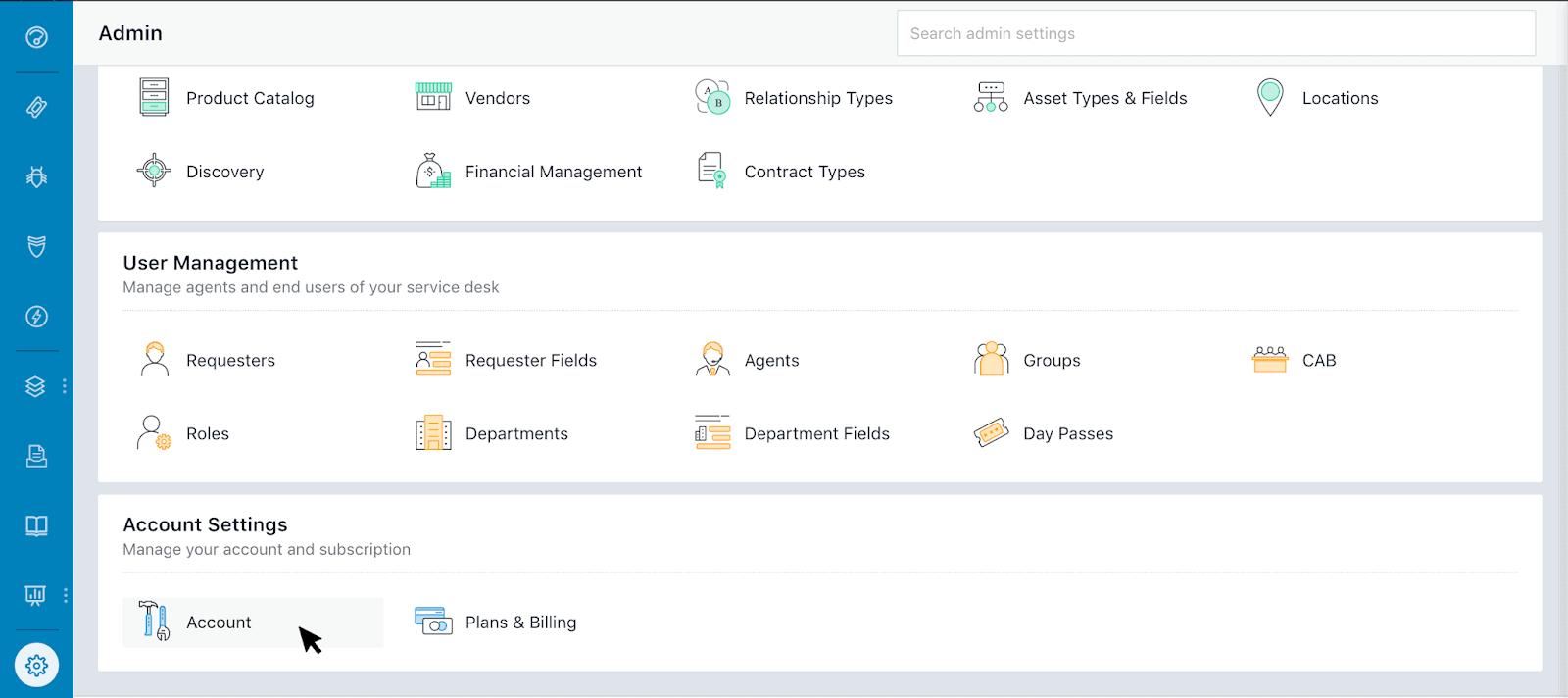
FreshService is a cloud-based ITSM software for the service desk. Its help desk and service management are specially designed for IT operations. The tool can also be integrated with third-party apps like Jira, GSuite, Zapier, Dropbox, AWS, and more, to allow easier service management. With Freshservice, you can automate tasks and internal processes with the Workflow Automator.
Key Features:
- Incident Management: Offers robust incident management capabilities, allowing organizations to track, prioritize, and resolve incidents efficiently.
- Asset Management: Includes comprehensive asset management features, enabling organizations to manage and track IT assets effectively.
- Release Management: Facilitates release management processes, helping organizations plan, coordinate, and deploy releases seamlessly.
- Service Catalog: Provides a service catalog for organizing and categorizing IT services, enhancing accessibility and request management.
Why do we recommend it?
FreshService is highly recommended for its cloud-based ITSM solution, offering intuitive help desk and service management functionalities. Its seamless integration with third-party apps streamlines service management processes, enhancing overall efficiency and productivity. With the Workflow Automator, organizations can automate daily tasks and internal processes, reducing manual effort and improving operational effectiveness. The platform's user-friendly interface and flexibility make it suitable for organizations of all sizes, catering to diverse IT requirements. Additionally, its support for multiple communication channels ensures accessibility and convenience for users.
You can automate daily tasks such as ticket assignment, followup approvals, and more. Freshservice allows tickets from multiple channels, such as via email, a self-service portal, chat, or phone. Freshservice's user interface is intuitive and requires little training. It is highly customizable and can also be configured for non-IT requirements. Freshservice offers support via email and phone.
Who is it recommended for?
FreshService is ideal for IT operations and service desks seeking an intuitive and customizable ITSM solution. Organizations of varying sizes and industries can benefit from FreshService's user-friendly interface and comprehensive feature set. Its flexible pricing options accommodate organizations with different budgets, making it accessible to small businesses and enterprises alike. With support for multiple communication channels, FreshService caters to diverse user preferences, making it suitable for teams with varying communication needs. Overall, FreshService is recommended for any organization looking to streamline IT service management and enhance operational efficiency.
Pros:
- User-Friendly Interface: Boasts one of the better user interfaces for ITSM tools, making it easy to navigate and use for both experienced and new users.
- Flexible Pricing Options: Offers flexible subscription and annual pricing options, accommodating organizations of various sizes and budgets.
- Self-Service Portal: Helps reduce inbound tickets by enabling users to resolve common issues independently.
- Simple Ticket Creation: User-friendly ticket creation, requiring minimal training for new staff, enhancing overall usability and efficiency.
Cons:
- Short Trial Period: Some users may find the trial period to be too short, potentially limiting the time available for comprehensive evaluation and testing.
- Complex Integrations: Integrations into other ITSM tools can be complicated, requiring additional effort and resources to set up and maintain.
Freshservice is available on an annual or monthly subscription basis. Their product is available in four editions:
- Blossom ($29 /agent/month)
- Garden ($58 /agent/month)
- Estate($87 /agent/month)
- Forest ($85 /agent/month) – billed yearly.
Freshservice offers a 21-day free trial when you sign up.
6. SolarWinds Service Desk
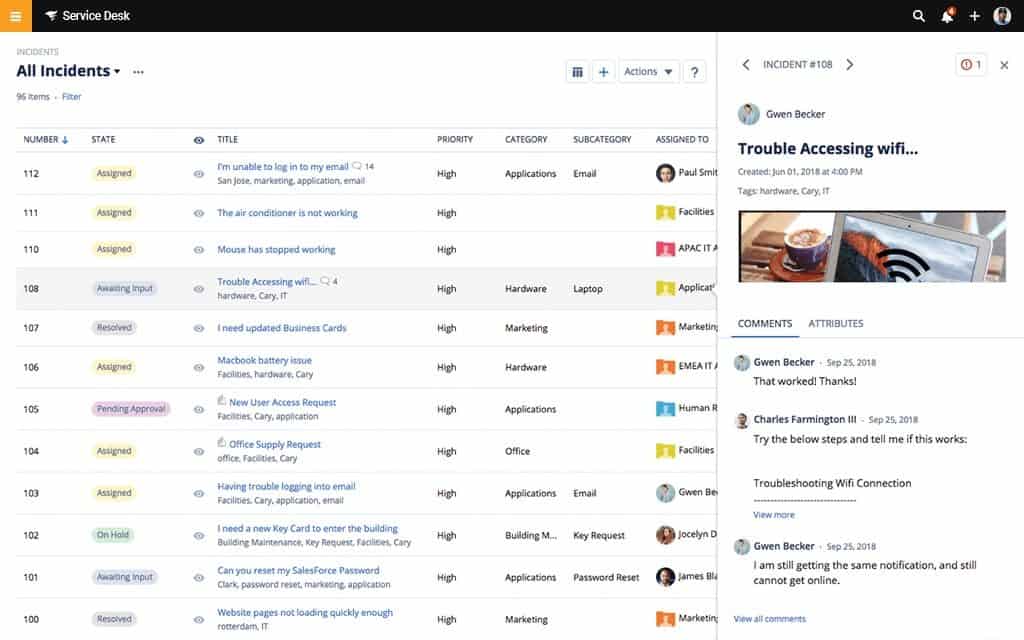
SolarWinds Service Desk is one of the most comprehensive web-based ITSM and service desk solutions. It allows you to manage your IT assets, employee services, incidents, problems, and more. The service desk solution provides a way to manage, submit, and prioritize all tickets and requests from the single service portal. The service requests can come from multiple channels, which include email, phone calls, and even a self-service portal.
Key Features:
- Service Catalog: Offers a comprehensive service catalog, allowing organizations to define and manage IT services efficiently.
- IT Asset Management: Includes robust IT asset management capabilities, enabling organizations to track and manage IT assets effectively.
- Integration with Over 200 Applications: Provides seamless integration with over 200 applications, ensuring compatibility and flexibility in IT operations.
- Reporting: Offers powerful reporting capabilities, allowing organizations to generate insights and metrics for informed decision-making.
Why do we recommend it?
SolarWinds Service Desk is highly recommended for organizations seeking a comprehensive web-based ITSM and service desk solution. With robust features for managing IT assets, employee services, incidents, and problems, Service Desk offers a centralized platform to manage, submit, and prioritize all tickets and requests. Our experience with Service Desk has highlighted its adherence to ITIL best practices, ensuring efficient resolution of IT incidents and streamlined IT operations. Additionally, the solution provides a complete knowledge base, empowering users with access to a consolidated database of articles and solutions for faster issue resolution.
Who is it recommended for?
SolarWinds Service Desk is recommended for organizations of all sizes looking for a versatile ITSM and service desk solution. Ideal for organizations that prefer an on-premise tool over a cloud solution, Service Desk offers a simple layout that makes management easy, even at scale. Whether you're a small business or a large enterprise, Service Desk provides integration with over 200 applications, ensuring compatibility and flexibility. While it may take time to fully explore the platform, Service Desk offers proactive alerts and SLA performance tracking, making it suitable for helpdesk teams striving for efficiency and compliance.
Pros:
- Simple Layout for Easy Management: Features a simple layout that makes management easy, even at scale, enhancing user experience and productivity.
- On-Premise Deployment Option: Suitable for organizations that prefer an on-premise tool, Service Desk offers flexibility in deployment options.
- Time Tracking and SLA Performance: Allows organizations to track time entries and SLA performance for helpdesk teams, ensuring accountability and compliance.
- Proactive Alerts: Proactively notifies staff when SLAs are in danger of being breached, enabling timely interventions and resolution.
Cons:
- Learning Curve: It may take time to fully explore the platform and leverage its full capabilities, requiring investment in training and familiarization.
SolarWinds Service Desk comes in three different editions:
- Team ($20.00)
- Business ($40.00)
- Professional ($70.00)
To get more information on prices, get a quote, or download a fully functional 30-day free trial of SolarWinds Service Desk.
7. SysAid
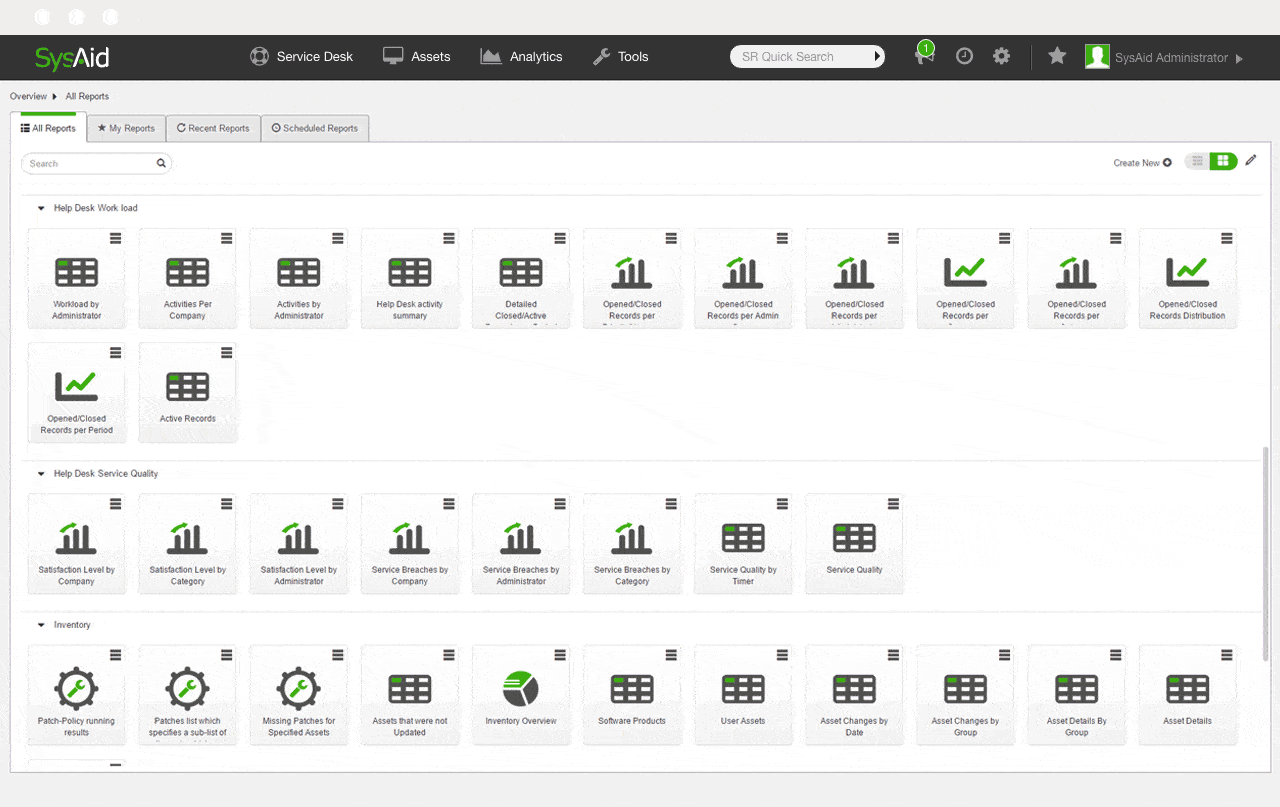
SysAid provides cloud-based ITSM, help desk, and service desk software. Its ITSM solution provides the ITIL (Information Technology Infrastructure Library) best practices. You can integrate this ITSM with other tools like the Help Desk and the Asset Management into a single platform. The SysAid Help Desk software includes essential features such as a comprehensive ticket management system, IT asset management, self-service portal, mobile device management, chat, and more.
Key Features:
- Self-Service Portal: Enables users to resolve issues independently, reducing dependency on IT support.
- Comprehensive Knowledge Base: Facilitates efficient troubleshooting and self-learning among users and support staff.
- Password Reset: Streamlines password management processes, enhancing security and user convenience.
- Remote Control: Allows IT teams to troubleshoot and resolve issues remotely, improving efficiency and minimizing downtime.
- Integration with Other Tools: Seamlessly integrates with Help Desk and Asset Management tools, consolidating IT operations onto a single platform for enhanced efficiency and productivity.
Why do we recommend it?
SysAid offers a comprehensive suite of cloud-based ITSM, help desk, and service desk software solutions, integrating ITIL best practices. Having tested the product ourselves, we found it to be robust and user-friendly, catering well to various organizational needs. With features like the self-service portal, extensive knowledge base, and efficient password reset functionality, SysAid streamlines IT operations effectively.
The IT ticket management system helps you track all issues throughout their life-cycle, from the first contact to resolve. The ticketing system includes incident management that enables you to log, process, manage, and report on issues.
Who is it recommended for?
SysAid is recommended for businesses seeking a versatile ITSM solution with customizable pricing options. It caters to a wide range of users, from small to medium-sized enterprises, providing essential features like ticket management, asset management, and remote control. Its flexibility in pricing makes it suitable for organizations of different scales, ensuring cost-effectiveness without compromising functionality.
Pros:
- SNMP Monitoring: Includes SNMP monitoring capability through a simple plugin, enhancing network monitoring and management.
- Flexible Pricing: Offers flexible pricing options, allowing users to choose the features they need and pay accordingly, ensuring cost-effectiveness.
- Patching Solution: Provides a good option for those requiring SNMP monitoring and patching solutions, enhancing network security and stability.
Cons:
- Limited Enterprise Features: Lacks some advanced features typically required by large enterprises, making it more suitable for small to medium-sized networks.
SysAid comes in three different editions:
- Basic (Help Desk, Ticketing, and Asset Management)
- Full (ITSM)
- A-La-Carte (features priced separately)
For more information, get a quote. Get a 30-days Help Desk free trial.
7. Zoho Desk
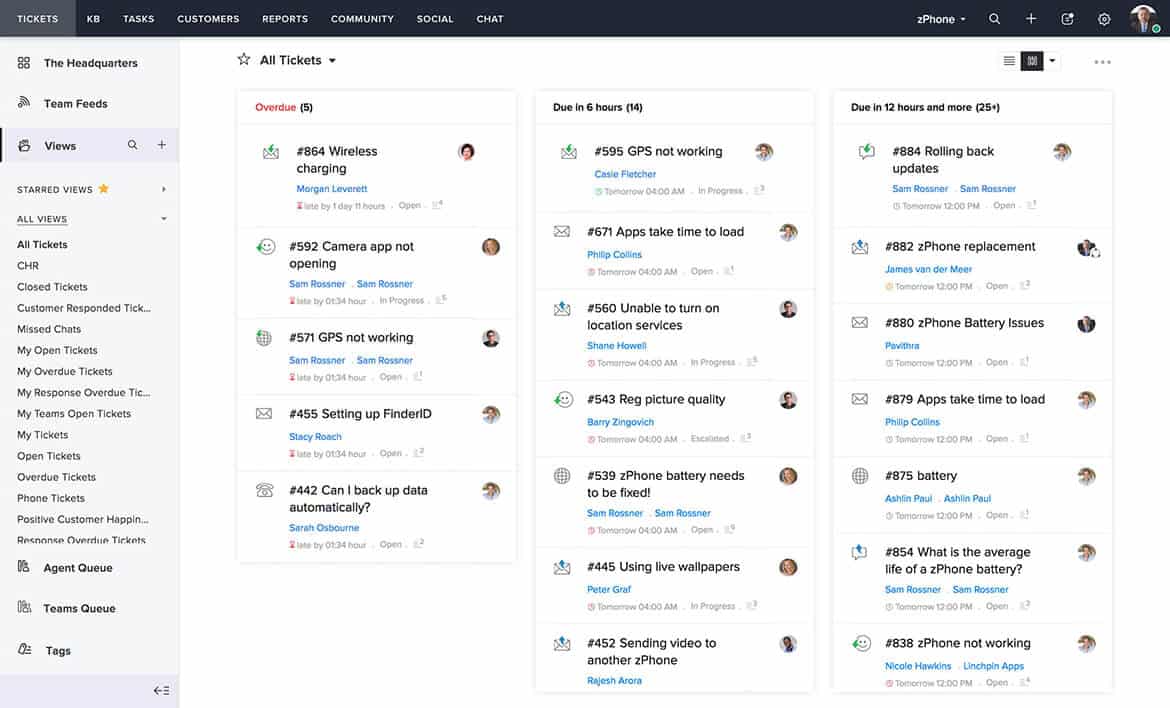
Zoho Desk is a web-based context-aware help desk software. It allows you to manage all customer support tasks from a single place. With it, you can assign, track, resolve and create alerts for tickets created by your customers, agents, or managers. The software comes with “Work Modes” that improve agent productivity.
Key Features:
- Multichannel Support: Enables communication across various channels including phone, chat, social media, and more, ensuring seamless interaction with customers.
- AI Assistant (Zia): Utilizes AI to enhance efficiency by providing contextual insights, dashboards, notifications, and more, empowering agents to deliver personalized support.
- Self-Service Portal: Allows customers to resolve issues independently, reducing ticket volume and enhancing customer satisfaction.
- Automatic Ticket Assignments: Streamlines ticket management by organizing tickets based on due time, customer type, and other criteria, facilitating prioritization and efficient resolution.
- Integration and Collaboration: Seamlessly integrates with third-party software for enhanced collaboration and workflow automation, improving overall customer service efficiency.
Why do we recommend it?
Zoho Desk stands out as a comprehensive web-based help desk software, offering efficient management of customer support tasks from a unified platform. Our testing experience confirms its effectiveness in streamlining ticket assignment, tracking, and resolution processes. With features like multichannel support, AI assistant Zia, and automated ticket assignments, Zoho Desk significantly enhances agent productivity and customer satisfaction.
It automatically organizes all the generated tickets according to due time, customer type, and more. This categorization allows for easy ticket management and prioritization. The tool also introduces AI, process-management, and a marketplace to improve customer service. An added bonus is the new Zia, which is an assistant that leverages AI to enhance the efficiency of customer service teams.
Who is it recommended for?
Zoho Desk is recommended for businesses seeking a versatile help desk solution with robust automation capabilities. Ideal for Managed Service Providers (MSPs), it offers white-labeling options and automation tools empowering technicians to deliver efficient solutions. However, its scalability and feature-rich interface make it suitable for various business sizes and industries, enhancing customer service operations across the board.
Pros:
- Cloud-Based Deployment: Simplifies deployment with a cloud-based installation, eliminating the need for on-premise onboarding, ensuring easy scalability and accessibility.
- White-Labeled Product: Ideal for MSPs seeking to customize the platform according to their branding, enhancing brand consistency and client experience.
- Automation Tools: Empowers technicians with scripting solutions, improving efficiency and accuracy in issue resolution.
- Mobile Report Support: Offers mobile report support for both iOS and Android devices, ensuring accessibility and convenience for on-the-go management.
- Pre-Remote Connection Execution: Allows execution of commands prior to remotely connecting, enhancing troubleshooting efficiency.
Cons:
- More Suited for MSPs: While versatile, Zoho Desk may be more tailored towards MSPs rather than smaller LAN networks, potentially offering more features than required.
- Short Trial Period: Users may desire a longer trial period to fully explore and evaluate the software's capabilities before making a commitment.
Zoho comes in four different editions:
- Free ($0 for up to three agents)
- Standard ($12/agent/month)
- Profesional ($20/agent/month)
- Enterprise ($35/agent/month)
All prices are based on a yearly plan. Sign up to get three agents with the Free plan.
8. Spiceworks Help Desk
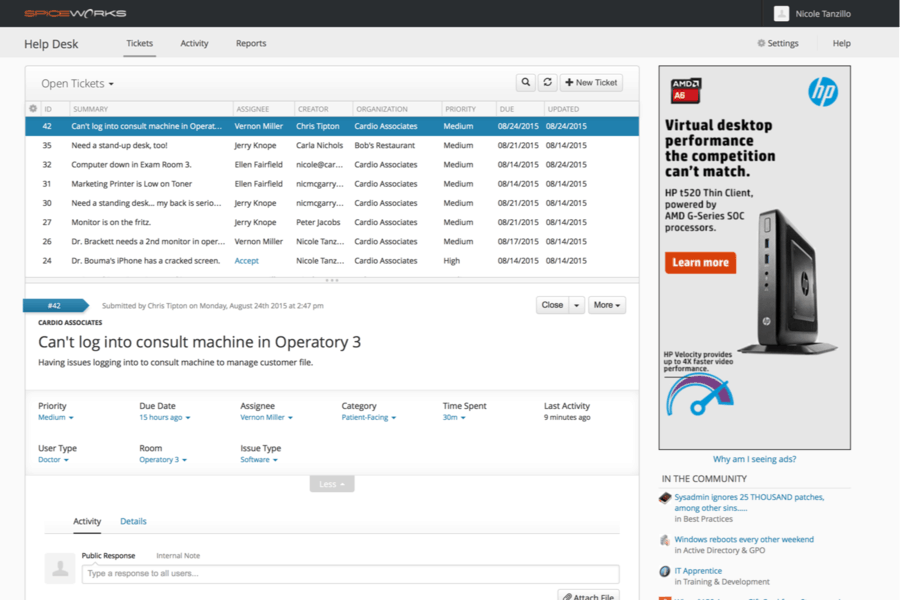
Spiceworks Help Desk is free cloud-based software that offers IT ticket management. The software comes with ticket monitors, alerts, custom ticket attributes, and rules. You can also get reports with critical information such as ticket updates and their priority. Employees or customers can submit tickets via different channels such as email or the self-service user portal.
Key Features:
- Spiceworks Help Desk Mobile App: Provides convenient access to ticket management functionalities on mobile devices, ensuring flexibility and on-the-go support.
- Multi-Channel Support: Allows ticket submission via various channels including email and self-service portal, facilitating seamless communication between users and IT support teams.
- Comprehensive Knowledge Base: Enables users to access relevant information and resources for issue resolution, reducing dependency on IT support and improving self-service capabilities.
- Auto-Assign Help Tickets: Automates ticket assignment processes, ensuring efficient allocation of resources and timely resolution of issues.
Why do we recommend it?
Spiceworks Help Desk comes highly recommended for its seamless blend of functionality, accessibility, and cost-effectiveness. Its free, cloud-based model makes it an attractive option for organizations looking to optimize IT ticket management without breaking the budget. Beyond its affordability, Spiceworks Help Desk offers a user-friendly interface that simplifies ticket submission, management, and resolution processes. Additionally, its availability of a mobile app enhances flexibility and ensures that IT professionals can stay on top of tasks even while on the go. With features like auto-assign help tickets and integration with Active Directory, Spiceworks Help Desk streamlines IT support operations efficiently.
When users submit their tickets to the portal, they can manage them, and even see their progress. The portal can integrate with the Active Directory for easier authentication. The Spiceworks Help Desk can also be installed on your mobile. You can get updates on tickets and configure push notifications on your mobile phone.
Who is it recommended for?
Spiceworks Help Desk is recommended for small to medium-sized businesses seeking a straightforward and cost-effective solution for IT ticket management. Its user-friendly interface and free cloud-based deployment model make it particularly appealing for organizations with limited IT budgets or resources. While it may lack some of the advanced features found in enterprise-level solutions, Spiceworks Help Desk excels in meeting the needs of smaller teams or departments seeking to streamline their IT support processes. Whether it's managing tickets via email, self-service portal, or mobile app, Spiceworks Help Desk offers the flexibility and simplicity that SMBs require to maintain efficient IT operations.
Pros:
- Completely Free: Offers a fully functional cloud-based helpdesk tool at no cost, making it a cost-effective solution for organizations with budget constraints.
- Spiceworks Help Desk Mobile App: Provides excellent functionality for mobile ticket management, enhancing accessibility and productivity for IT teams.
- Flexible Deployment Options: Offers both on-premise and SaaS versions, providing flexibility to organizations based on their preferences and infrastructure.
Cons:
- Limited Support for Desktop Version: The desktop version may not receive as much support or updates as the cloud-based version, potentially leading to disparities in functionality and performance.
It's 100% free, however, it is supported by ads. Sign up to get free access.
9. BMC Helix ITSM (Remedy)
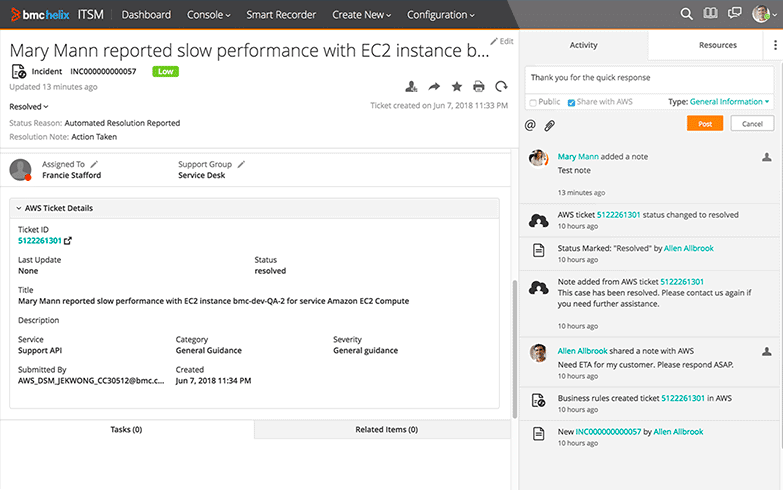
BMC Helix ITSM (or next-gen Remedy) is a cognitive automation software for IT service management. It can be deployed on-premises, in any private or public cloud or hybrid environments. BMC Helix is available for multi-channels. Users can interact with the system through email, mobile, and social media. The solution is cognitive. It can perform proactive and predictive tasks, such as automation of repetitive functions, auto-classification and routing, automatic assignment according to expertise, and more.
Key Features:
- Optimized for ITIL 4: Aligned with ITIL 4 standards, ensuring adherence to industry best practices and enabling efficient IT service delivery.
- Rich Reports and Visualizations: Provides comprehensive reports and visualizations, offering insights into IT operations and performance metrics for informed decision-making.
- Multi-Cloud and Multi-Device (IoT) Support: Enables management of IT services across diverse cloud and IoT environments, ensuring seamless integration and compatibility.
- Cognitive Automation Capabilities: Employs cognitive automation for proactive and predictive tasks, automating repetitive functions, auto-classification and routing, and automatic assignment based on expertise.
- Chatbot and Virtual Agents: Provides virtual agents and chatbots for level one ticket resolution, enhancing user experience and reducing dependency on human intervention.
Why do we recommend it?
BMC Helix ITSM (Remedy) is highly recommended due to its robust cognitive automation capabilities, which streamline IT service management processes effectively. Through automation of repetitive tasks and proactive, predictive functions, BMC Helix ITSM enhances operational efficiency and productivity within IT departments. Additionally, its alignment with ITIL4 standards ensures adherence to industry best practices, fostering a structured approach to service delivery and management. The solution's user-friendly interface further contributes to its recommendation, offering intuitive navigation and accessibility for IT professionals across various skill levels. Overall, BMC Helix ITSM's comprehensive feature set and cognitive automation make it a standout choice for organizations aiming to optimize IT operations and improve service quality.
It also provides virtual agents and chatbots to work on level one tickets. BMC Helix also provides the chatbot, which is more than a simple knowledge base. This chatbot lets BMC users interact with a bot, and get information from articles and tutorials much faster.
Who is it recommended for?
BMC Helix ITSM is recommended for organizations of all sizes seeking to modernize their IT service management processes and leverage cognitive automation technologies. Its deployment flexibility across on-premises, private or public cloud, and hybrid environments makes it suitable for diverse organizational infrastructures. While larger networks with in-house remediation teams can fully capitalize on its capabilities, smaller enterprises can also benefit from its scalable features and adherence to industry standards. Whether aiming to enhance incident resolution, automate routine tasks, or improve overall service delivery, BMC Helix ITSM caters to the needs of IT departments striving for efficiency and innovation.
Pros:
- Simple Yet Intuitive Interface: Offers a user-friendly interface, ensuring ease of use and accessibility for IT teams of all skill levels.
- Automated Security Tasks: Capable of automating security tasks such as vulnerability scans and network probes, enhancing overall cybersecurity posture.
- Configuration Restoration Automation: Minimizes downtime and ensures system integrity.
- Support for Multi-Cloud and Hybrid Cloud Environments: Ensures flexibility and scalability in IT infrastructure management.
Cons:
- Better Suited for Larger Networks: While versatile, BMC Helix ITSM may be better suited for larger networks with dedicated in-house remediation teams, potentially offering more features and capabilities than required for smaller environments.
Sign up to start a BMC Helix free trial.
Conclusion
Jira is one of the most popular services and help desk solutions out there. Its ticketing system is very effective, responsive, and comes with many features.
But according to many users, the software can be challenging to learn and implement. Fortunately, there are some fantastic Jira service desk alternatives and replacements out there that we've outlined above.
If you are looking for something more flexible and straightforward, grab one of the tools from above and get going! Many of them have free trials for 30 days to get you started immediately!
Some of the tools shown here are easier to grasp and don't need much management. They can be installed on-premises or even use them from the cloud, depending on your preferences!
A couple of them are 100% free, and others allow a couple of agents for free— which is a great option to test the waters.
Comprehensive tools like SolarWinds Service Desk, ManageEngine ServiceDesk Plus and Zoho Desk have similar capabilities as Jira, and the best thing is that they all allow free trials! Good Luck!
JIRA Service Desk Alternatives FAQs
What are the key features of JIRA Service Desk?
The key features of JIRA Service Desk include request management, incident management, problem management, SLA management, knowledge management, and reporting.
What are the reporting capabilities of JIRA Service Desk?
JIRA Service Desk provides a range of reporting capabilities, including the ability to generate reports on request, incident, and problem volume, SLA performance, and knowledge management. Additionally, JIRA Service Desk provides real-time dashboards and visualizations to help IT and support teams track key performance indicators.
How does JIRA Service Desk integrate with other JIRA products?
JIRA Service Desk integrates with other JIRA products, including JIRA Core and JIRA Software, providing a centralized platform for managing IT and support processes, as well as software development processes.
How do I customize JIRA Service Desk for my organization?
To customize JIRA Service Desk for your organization, you can use the JIRA Service Desk administration console to configure workflows, SLAs, and other settings to meet your specific needs.
